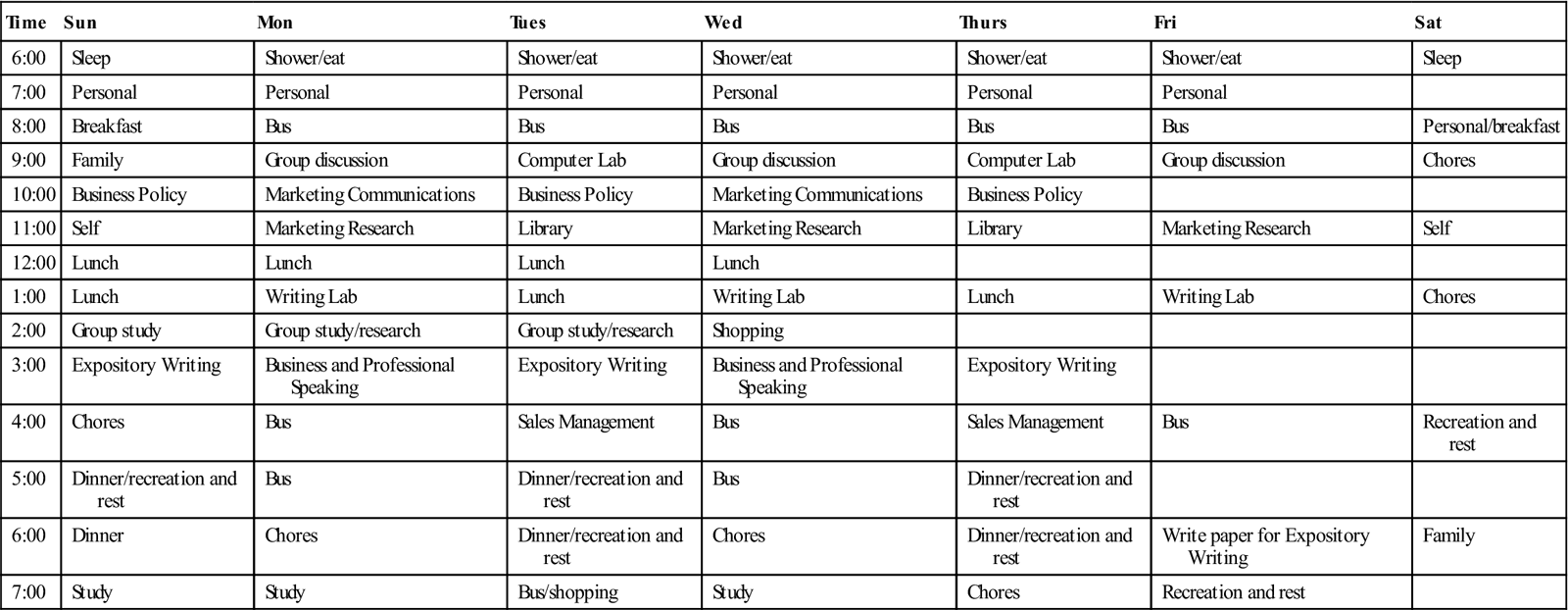Tools of the Trade
A Career as a Health (Medical) Insurance Professional
Chapter objectives
After completion of this chapter, the student should be able to:
1. List the entry-level skills necessary for success in the health insurance professional’s career.
2. Discuss college courses typically included in a medical insurance billing and coding program.
3. Explain the importance of effective study skills and proper preparation to maximize learning.
4. Demonstrate the importance of time management by developing and using a time management chart.
7. Explore career prospects and job opportunities for health insurance professionals.
8. Predict possible rewards of a career in medical-related fields.
9. Investigate certification possibilities related to the field of insurance billing and coding.
Chapter terms
application
autonomy
CMS-1500 claim form
certification
communication
comprehension
covered entity
diligence
electronic data interchange (EDI)
initiative
integrity
objectivity
paraphrase
prioritize
professional ethics
trading partners
Your future as a health insurance professional
Before you begin any college or vocational program, you might want to ask yourself, “Where will this take me, and what career opportunities are available to a graduate of this type of program?” You should think about several things. Naturally, the first question in many individuals’ minds is, “How much money can I make?” That question is logical, but other factors should be considered when choosing a career. One wise person said, “If you choose a job you love, you will never have to work a day the rest of your life.”
Although there are many different career paths you can choose in the area of healthcare, this chapter refers to the domain of medical expertise of a “health insurance professional,” sometimes referred to as a medical insurance specialist. The administrative health insurance professional plays a crucial role in healthcare and one that is increasingly in demand. Qualified health insurance professionals (also referred to as medical billing and coding specialists) are experts in generating, submitting, and tracking insurance claims for a variety of payers and ensure that insurance companies reimburse the healthcare provider (and/or patient) appropriately and in a timely manner for services rendered. Those trained as health insurance professionals are vital not only to healthcare providers but to health insurance companies as well. They also play an important role in patient advocacy. Although job opportunities in this career field are increasing because of the relatively complex nature of health insurance in general (particularly the coding process), the industry is placing great emphasis on training and experience. Certification is recommended and is available for various specialties in the allied health field. Certification tells prospective employers that the individual possesses the skills necessary in a particular area, which helps the office run efficiently and effectively and provides for each patient’s specific needs. (See “Certification Possibilities” later.)
It should be noted here that although we refer to this career field as “health insurance professional,” there is no nationally recognized title or acronym for this broad specialty.
Required Skills and Interests
Success as a health insurance professional requires a certain degree of competency or knowledge in general educational areas. To increase the potential for success, candidates entering this field should possess college entry–level skills in the following areas:
Education
Many community colleges and career training schools offer programs that provide graduates with the skills to become specialists in the health insurance field. Typically, students begin the program with core courses that are built on in the later stages of the program. They receive extensive hands-on training and practice in medical insurance billing and coding and in computerized patient account management. Box 2-1 lists courses included in a typical insurance billing professional program.
Program length for a health insurance professional is 2 to 4 years at community colleges and technical schools and 4 to 9 months at a career school. Most community colleges offer a 2-year associate degree in this discipline. A 4-year college typically awards a Bachelor of Science degree in health science, healthcare management, or whatever specific health fields are offered. Diplomas and certificates also can be obtained from correspondence or online courses and home study programs. A graduate of a health insurance professional or billing and coding program has opportunities for entry-level employment as a medical biller, medical coder, or other health insurance–related position in hospitals, nursing homes, physicians’ offices, ambulatory care facilities, medical or surgical supply companies, or billing service companies.
Preparation
Another important key for success in any career, besides basic entry-level skills and applicable education, is proper preparation. You might have deduced from the scenario that Joy and Barbara have been out of school for several years. Both women think their study skills need sharpening. To succeed in any formal college or training program, you must have good study skills.
Schools today encourage “lifelong learning.” This means that learning will not stop when you graduate from the college or career program you have chosen but that you will continue to learn for the rest of your career—or, ideally, the rest of your life. In healthcare, this is especially true because this discipline is constantly changing. Many students who have been out of school for several years find that their study skills may be a little rusty. Even if you have been out of school for only a short time, you still may need help to “get back in the groove” of studying. The following is a list of suggestions that may help you develop effective study skills to enhance your chances of success:
1. Prioritize Your Life. Develop a weekly time management schedule in which tasks and activities are prioritized (organized by importance). Make sure this schedule:
• allows time for studying each specific subject,
• spreads out study times throughout the week,
• permits time for recreation and rest and family, and
• grants periodic “rewards,” such as watching TV or lunch out with friends.
Make a list of the things you need to do (just as you make a list before you go grocery shopping). Do not create a schedule that is too detailed or rigid. As you progress, make adjustments as needed. Table 2-1 provides an example of a time management schedule.
2. Learn How to Study. Choose a quiet, suitable area where you
• will have minimal interruptions,
• can be comfortable enough to focus on your work, and
• are close to resources (e.g., computer, reference materials).
3. Develop Positive Personality Traits. Not everyone is suited to working in the field of medicine. Following is a list of desirable personality traits and qualities of character that experts believe an individual should possess to be successful in this field:
• Diligence (sticking with a task until it is finished)
• Integrity (having honest ethical and moral principles)
• Objectivity (not influenced by personal feelings, biases, or prejudices)
• Initiative (readiness and ability to take action)
4. Prepare for Class. Getting the most out of the courses you take involves effort on your part. The time and effort you invest in your preparation before class and the time you spend in class greatly affect what you get out of your schooling:
• Attend every class and be on time.
• Become an active participator—ask questions and take notes.
• Learn to recognize important points in the text and from lectures.
• Outline, underline, highlight, or make notes in the text margins.
• Work through questions/examples until you understand them.
• Communicate with your instructor and other students.
• Complete all homework and assigned readings on time.
• Develop the ability to concentrate.
• Paraphrase (write down in your own words) important facts from lectures and readings.
| Time | Sun | Mon | Tues | Wed | Thurs | Fri | Sat |
| 6:00 | Sleep | Shower/eat | Shower/eat | Shower/eat | Shower/eat | Shower/eat | Sleep |
| 7:00 | Personal | Personal | Personal | Personal | Personal | Personal | |
| 8:00 | Breakfast | Bus | Bus | Bus | Bus | Bus | Personal/breakfast |
| 9:00 | Family | Group discussion | Computer Lab | Group discussion | Computer Lab | Group discussion | Chores |
| 10:00 | Business Policy | Marketing Communications | Business Policy | Marketing Communications | Business Policy | ||
| 11:00 | Self | Marketing Research | Library | Marketing Research | Library | Marketing Research | Self |
| 12:00 | Lunch | Lunch | Lunch | Lunch | |||
| 1:00 | Lunch | Writing Lab | Lunch | Writing Lab | Lunch | Writing Lab | Chores |
| 2:00 | Group study | Group study/research | Group study/research | Shopping | |||
| 3:00 | Expository Writing | Business and Professional Speaking | Expository Writing | Business and Professional Speaking | Expository Writing | ||
| 4:00 | Chores | Bus | Sales Management | Bus | Sales Management | Bus | Recreation and rest |
| 5:00 | Dinner/recreation and rest | Bus | Dinner/recreation and rest | Bus | Dinner/recreation and rest | ||
| 6:00 | Dinner | Chores | Dinner/recreation and rest | Chores | Dinner/recreation and rest | Write paper for Expository Writing | Family |
| 7:00 | Study | Study | Bus/shopping | Study | Chores | Recreation and rest |

In addition to the previously listed classroom skills, individuals experienced in working as health insurance professionals suggest that candidates for this field should be able to:
Stay updated, free articles. Join our Telegram channel

Full access? Get Clinical Tree



